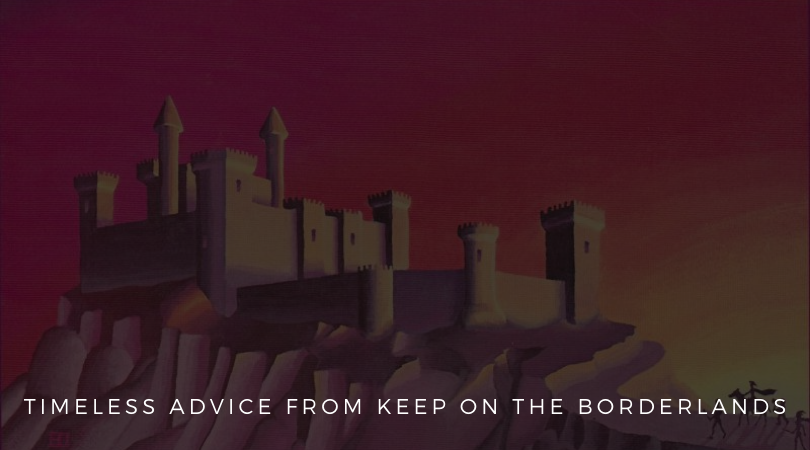Timeless Advice From Keep on the Borderlands

As you might know, I'm an old fart when it comes to gaming. I cut my teeth on Basic D&D and Advanced Dungeons & Dragons back in the 80s; decades later, I still love returning to the "scene of the crime".
I've been recently re-reading classic tomes like the AD&D 1st edition Dungeon Master's Guide to see what lessons the games of yesteryear can teach the GMs, players and designers of today.

It was inevitable, though, that I'd also check out the famed stalwart of the early hobby—B2 Keep on the Borderlands. As you probably know, the module is an introductory adventure, and so it has some special notes for beginning players and GMs.

DM Advice
All the notes below are direct quotes from page 4 of the Keep on the Borderlands. I hope you’ll agree this advice is both timeless and (ironically) basic.
- The DM must be fair. He or she cannot be "out to get the players" nor should he or she be on their side all the time.
- If a party has played well and succeeded, the DM should not punish them by sending more and more monsters at them or thwart their plans.
- If the players have acted foolishly, they should get their “just rewards”.
- In combat, the DM should play the monsters to the best of the monster's ability.
- The DM must be fair, but the players must play wisely.
- The DM is also the designer of the situation and must bear in mind the abilities of his or her players.
- It is the job of the DM to see that the situations and characters balance.
- As DM, much satisfaction comes from watching players overcome a difficult situation. But they should do it on their own.
- To defeat monsters and overcome problems, the DM must be a dispenser of information.
- The players must be allowed to make their own choices.
- It is important the DM give accurate information.
- The DM must remember that he or she is in control.
The dynamics and size of most gaming groups have changed since Keep on the Borderlands was written. That said, it’s good to see the basic principles of being a GM haven't changed that much over the last forty years. A GM reading the list above today could implement all of Gary’s suggestions. (In fact, I’d argue every GM should follow his advice.)
The only piece of advice above I slightly disagree with is "It is the job of the DM to see that the situations and characters balance.” I agree with that up to a point, but I’d add the caveat, “unless the players do something stupid."
Player Advice
The notes below are all direct quotes from page 25 of the Keep on the Borderlands. Again, I hope you’ll agree this advice is both timeless and (ironically) basic.
- Players should be organised and cooperative.
- Each player should have complete information on his or her character easily on hand.
- Players should work together to use their abilities effectively.
- Arguing among players will cause delays, attract monsters and often result in the deaths of some or all of the members.
- Cooperation should also be given to the DM.
- The game should be fun for all involved.
- Planning is another important part of play.
- Caution is also necessary and is a part of planning. A party that charges forward without preparation is almost certainly doomed.
- Too much caution is as dangerous as too little.
- Above all a player must think. The game is designed to challenge the minds and imaginations of the players. Those who tackle problems and use their abilities, wits and new ideas will succeed more often than fail.
- The challenge of thinking is a great deal of the fun of the game.
All the advice above remains relevant today. It’s all basic, foundational stuff, and that cheers me immensely. While many of today's games have evolved to be more complex, more tactical and more option rich, they are essentially the same game. And that’s a good thing.
Want More?
What never changes about our beloved hobby?


Member discussion